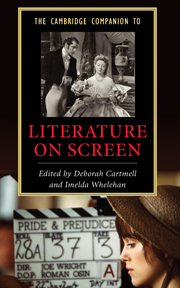Book contents
- Frontmatter
- Introduction - Literature on screen: a synoptic view
- Part One Theories of Literature on Screen
- Part Two History and Contexts
- Part Three Genre, Industry, Taste
- Part Four Beyond the "Literary"
- 13 Classic literature and animation: all adaptations are equal, but some are more equal than others
- 14 High fidelity? Music in screen adaptations
- 15 From screen to text: novelization, the hidden continent
- 16 A practical understanding of literature on screen: two conversations with Andrew Davies
- Further reading
- Index
- Series List
15 - From screen to text: novelization, the hidden continent
from Part Four - Beyond the "Literary"
Published online by Cambridge University Press: 28 September 2007
- Frontmatter
- Introduction - Literature on screen: a synoptic view
- Part One Theories of Literature on Screen
- Part Two History and Contexts
- Part Three Genre, Industry, Taste
- Part Four Beyond the "Literary"
- 13 Classic literature and animation: all adaptations are equal, but some are more equal than others
- 14 High fidelity? Music in screen adaptations
- 15 From screen to text: novelization, the hidden continent
- 16 A practical understanding of literature on screen: two conversations with Andrew Davies
- Further reading
- Index
- Series List
Summary
What is the common feature of books such as King Kong (Delos W. Lovelace), La Dolce Vita (Lo Duca), Les Vacances de Monsieur Hulot (Jean-Claude Carrière), Les 400 coups (François Truffaut and Marcel Moussy), Jabberwocky (Ralph Hoover), Basic Instinct (Richard Osborne), The Full Monty (Wendy Holden), Saving Private Ryan (Max Allan Collins) or eXistenZ (Luther Novak)? Are they (unknown) books adapted into (famous) movies, following the old saying that only bad literature can be turned into good cinema? Quite the contrary: all these books are novelizations, i.e. novels based on previous and normally “original” filmic texts (I will come back later to the question on the meaning of the word “text”).
Within the field of film and literature studies, novelizations represent an ignored field, whose quantitative importance (since there exists a real novelization industry) and qualitative diversity (since “novelization” has many meanings depending on various national and linguistic traditions in which it appears) has never been fully acknowledged. Today, however, this situation seems to be changing rather rapidly. First, economically speaking, novelizations have become more visible, following the generalization of “cross-media narrative” in contemporary Hollywood storytelling and hence the subsequent multiplication of novelized films. In fact, each major Hollywood film that is not based itself upon a previous novel or play tends to be transformed into a novel (among other types of commercial tie-ins, of course). But there is also a second reason, which is more academic and which has to do with the crisis of traditional adaptation studies in the film and literature field. The critical questioning of most of the theoretical and methodological underpinnings of adaptation studies are both cause and effect of the new interest in novelization.
- Type
- Chapter
- Information
- The Cambridge Companion to Literature on Screen , pp. 226 - 238Publisher: Cambridge University PressPrint publication year: 2007
- 4
- Cited by



